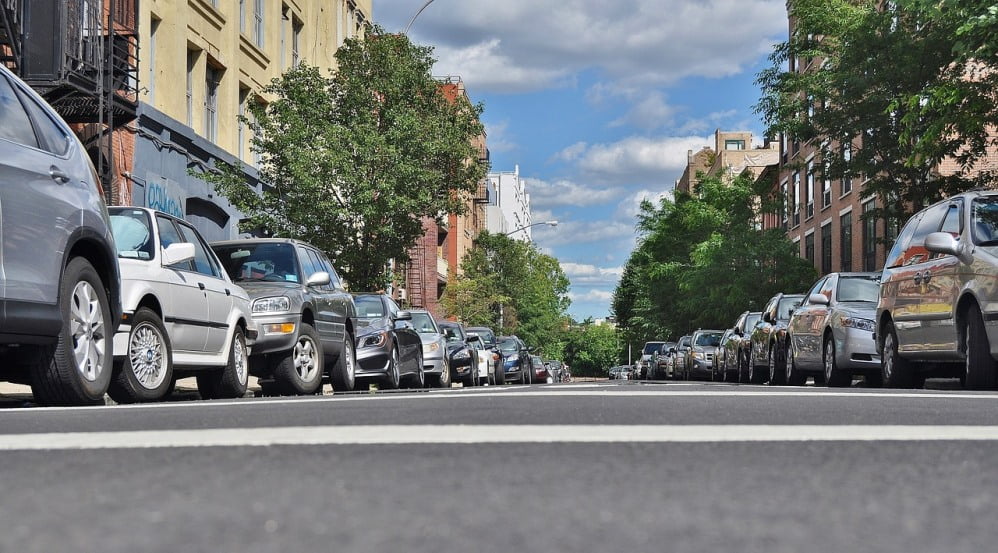Sick and tired of the parking woes in congested cities? Despair not, as a slew of new Israeli mobile apps have risen from tech-geek dens to quickly locate available curbside parking spots – and the fastest way for you to snatch them.
Similar to Israeli app Waze (bought by Google in 2013), which calculates the fastest route for drivers to get from point A to point B, several new mobile apps will help you navigate to the nearest available parking spot, using the wisdom of the crowds. Along with park-and-pay pioneers Pango and CelloPark, up-and-coming Israeli startups such as Anagog, Polly, ParkLife and Parko are changing the way we park our cars. Using different methods, algorithms and platforms, these companies seek to help their users locate and pay for those often elusive spots, saving time, gasoline and money while doing so. NoCamels profiles six of the hottest parking apps developed in Israel.
SEE ALSO: Social Navigation – A New Approach to Driving
Anagog
Founded in 2014, Anagog provides directions to free parking spots and parking lots using parking data retrieved from cellphone users, in a similar crowd-sourcing method used by Waze. Anagog’s mobile app, called EasyPark, collects data on individual parking behavior, which it then saves for future reference. Anagog also provides push notifications on vacated parking spots.
In the course of roughly one year, Anagog has been able to recruit 100,000 users in Israel and 500,000 users worldwide and the company has so far raised $1 million. One of the major selling points of the software is its remarkable power consumption – 0.1 percent per hour. Another benefit of Anagog is that it provides both two and three dimensional map views, to allow users to select a parking lot near their desired location. All they then need to do is follow the voice-controlled, turn-by-turn navigation to their parking spot.
Parko
Parko is an Israeli crowd-sourced parking guide, which seeks to make parking simpler for its users. Founded in 2011, Parko collects data on road closures, traffic patterns, days of the week, weather, and even local events that may affect parking. It then relays the necessary information to its users.
SEE ALSO: Can New App ‘Parko’ Forever Solve Urban Jungle Parking Nightmare?
The app – currently available in France – provides directions to available parking spots, with real-time updates from other users. It also shows soon-to-be-vacated-spots (based on parking meters and other data), including curb parking, which helps its users stay up-to-date on available parking spots. This app also reminds its users where they parked and offers a number of coupons and prizes to its users for sharing parking spots with others.
In two rounds of funding thus far, Parko has raised $1 million.
ParkLife
Another promising Israeli company is ParkLife, which also runs on the platform of “minimizing parking search time and costs, both for the curb and off-street parking,” according to the company. ParkLife uses a unique algorithm to collect data and self-learn, trying to provide the most optimal routes to parking spots.
Sign up for our free weekly newsletter
SubscribeIn the case no curb parking is available, the app guides its users to a nearby parking lot, then provides walking directions to their destination. ParkLife highlights the route that will maximize chances of finding a parking spot near the desired location. Within the app’s map, there are both red and blue paths, with blue indicating a high probability of finding a spot and red, a low chance. In addition, the app tells users which curbs are permissible to park by, versus those where parking is prohibited. Orange paths indicate a parking lot, making for a simple and efficient color-coded system.
Polly
“Polly The Parking Fairy” is a new free App that aims to eliminate the frustration associated with finding a parking spot in the big city, saving time, money and decreasing pollution on the way. Launched this year, “Polly” emulates driver behavior and guarantees a parking space – whether in a lot or on the street – within 11 minutes of cruising. According to the company, it also increases the chance of finding cheap, on-street parking by 75 percent.
Polly comes into action as drivers approach their destination, displaying a personalized map and turn-by-turn navigation directions through nearby streets with the greatest chance of finding on-street parking. The route is based on statistical information about streets with the highest parking turnover. The app uses data compiled during months of fieldwork mapping all city parking spots. At this time, Polly is available in Tel Aviv, Israel, with plans to expand to the US and Europe.
Pango
One of the most popular parking apps is Pango, a pioneer in this filed, which was founded in 2005. The app offers the convenience of cashless paying for curbside parking – without the need to use parking meters. It’s available for Android, iOS, and BlackBerry users in 60 cities in the US and Israel.
This app also reminds its users when their time is running out, allowing them to buy more time, acting as a virtual parking meter at the touch of your fingertips. Pango’s most recent round of funding garnered $6.5 million last year.
CelloPark
A similar park-and-pay smartphone service is also offered by an Israel company called CelloPark, which along with Pango, pioneered cashless paying for parking. CelloPark allows drivers to pay for parking through the use of their personal mobile phone in metered, on-street parking areas. It charges on a minute-by-minute service, which means the driver doesn’t need to pay for a whole hour.
With the variety of parking apps available today, it seems that Israeli startups could soon take this promising market and international need by storm. In such a lucrative industry valued at $50 billion in Western Europe alone, the reasons are obvious. A simpler, more efficient means of parking within inner cities not only saves time and money, it also helps to keep the environment cleaner by saving gas!
Photos and videos: JaseMan, Anagog, ParkLife, Polly
Related posts

Editors’ & Readers’ Choice: 10 Favorite NoCamels Articles

Forward Facing: What Does The Future Hold For Israeli High-Tech?

Impact Innovation: Israeli Startups That Could Shape Our Future






Facebook comments